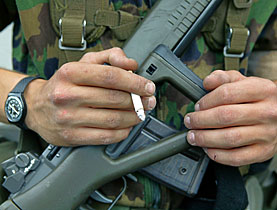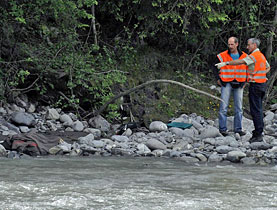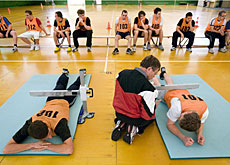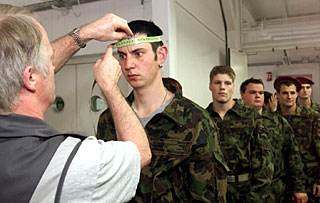Army defends revised fitness guidelines

Headlines that vegans and people who take the odd Ecstasy pill are no longer deemed fit for military service have provoked bafflement from politicians.
But the Swiss army says the latest edition of its Nosologia Militaris, a set of medical guidelines for weeding out unsuitable conscripts and recruits, has in fact resulted in an increase in the number of young Swiss soldiers.
The previous Nosologia Militaris was written in 1999 and has now been updated “to reflect the needs of the army”, according to the defence ministry. While vegans are now out, some asthmatics and many people with minor heart problems or hyperactivity disorders are in.
“Medicine has made progress,” Gianpiero Lupi, surgeon general of the Swiss armed forces, told swissinfo. “Since 1999 many diseases can be cured or treated in a way that make the conscript suitable for military service.”
Certain arrhythmias (abnormal heart activity) for example can be treated with ablation (the removal of tissue), he says – “a very safe and relatively simple intervention” – enabling people with a low-risk of heart problems to be declared fit.
However, coronary heart disease still bars you from either military or civilian protection service – although some people have raised eyebrows that a recent quintuple bypass didn’t prevent Hans-Rudolf Merz from returning to his job as finance minister.
“Also some people with asthma [who previously made up five per cent of rejected recruits] can now be declared fit with proper medication,” Lupi said.
The Nosologia Militaris 2008, which contains a wide range of information for joining the army from eyesight to homosexuality (not a problem), differentiates between compulsory and recommended unfitness and also between military and civilian protection service.
People with Type I diabetes for example remain “compulsorily unfit” for military service but only “recommended unfit” for civilian protection service. Doctors are now encouraged to declare people already in the army with Type II diabetes unfit for military service.
“In a lot of cases it’s up to the doctor’s discretion and experience based on the whole situation,” said Lupi, who is responsible for the guidelines.
Recruitment
All able-bodied Swiss men are called up to do military service. If you are declared fit for military service – as on average two-thirds of conscripts are – the only way out is to opt on ethical grounds for civilian community service. This lasts 50 per cent longer than military service.
If you are declared unfit for military service, you can still be declared fit for civilian protection service – as on average 17 per cent are.
Those declared unfit for both military service and civilian protection service – on average 17 per cent – have to hand over three per cent of their taxable income, with a minimum sum of SFr200 ($170).
Those in the civilian protection service have to pay an amount that depends on how much time they spend “protecting”.
Military and civilian protection service is optional for women and Swiss living abroad.
Thin argument
Some of the more notable changes in the Nosologia Militaris 2008 include a lower minimum weight limit. Aspiring recruits with a Body Mass Index (BMI) under 18 – which equates to weighing 50kg with a height of 1.70m – are now immediately rejected. Previously doctors were encouraged to reject people with BMIs under 20.
At the other end of the scales, obese people with a BMI over 40 may not begin military service.
The guidelines for people with ADHD (Attention-Deficit Hyperactivity Disorder) have been relaxed, enabling such people to be declared fit for military service as long as they have not taken specific medication such as Ritalin for at least a year.
Good news for sleepwalkers: somnambulism is now only a recommended cause for inadmission to the army. There’s only a problem if you’ve gone for a stroll within the past two years. Recruiters for the civilian protection service don’t care whether you sleepwalk or not.
Designer debate
One of the more controversial areas concerns vegans. People who shun animal products of any kind – and can prove they have done so “for an extended period” – now face recommended rejection from both military and civilian protection service. This is for practical reasons, it is argued. Vegetarians have no such problems.
Lupi says this issue has been blown out of proportion – “there are two or three cases a year”.
Designer drugs – psychoactive drugs created to get round existing drug laws – have been moved from the cannabis section and are now treated like cocaine and other hard drugs.
As such, a doctor’s certificate or drug-related mental problems result in mandatory unfitness, but the occasional use of such drugs is not a ground for instant rejection.
“We have clearly written that doctors are not forced to declare someone unfit just because they took Ecstasy,” Lupi said.
Smoking cannabis and drinking alcohol are only considered problems by the army when dependency is clear.
Political reaction
Nosologia Militaris 2008 came into force for the whole army on June 1 but has applied to the recruitment process since summer 2007.
However, politicians of all colours were unimpressed. “I expect quite a few young men will now alter their eating habits,” said Mario Fehr from the centre-left Social Democrats.
Green parliamentarian Josef Lang reckoned that had these definitions been in place in the 1970s, “half the male population would have become vegan”.
“If it becomes so easy to get out of doing military service, the motivation of those who do do it will drop,” warned Bruno Zuppiger from the rightwing Swiss People’s Party and president of the security policy committee of the House of Representatives.
Lupi dismissed such concerns. “It doesn’t mean that the numbers of unfit young men will suddenly increase! The truth is that based on these new guidelines we’ve seen a demonstrable increase in the fitness ratio – it’s not massive, but there hasn’t been a negative impact,” he said.
“Taking one Ecstasy pill doesn’t make a recruit unfit.”
According to the federal constitution, the army’s task is to prevent war and contribute to the maintenance of peace. It supports civilian authorities when there are serious threats to internal security and during crises.
Since the end of the Cold War, the army has also participated in humanitarian and peace missions.
During the Cold War, the Swiss army numbered 600,000 men who could be called up at short notice. In 1995 the army was reduced to 400,000 and today it stands at 220,000: 120,000 active soldiers, 20,000 recruits and 80,000 reservists.
Able-bodied males between the ages of 20 and 36 serve 260 days of military service, unless they do civilian protection service or, if ruled unfit for both, pay three per cent of their income. Military service is optional for women and Swiss living abroad.
The recruitment acceptance rate was 66 per cent in 2007. Cantons Obwalden and Nidwalden had the highest fitness rates – of 85 and 82 per cent respectively – whereas cantons Basel City and Zurich just creep over the 50 per cent mark.
The Swiss army has an annual budget of just under SFr4 billion ($3.4 billion).

In compliance with the JTI standards
More: SWI swissinfo.ch certified by the Journalism Trust Initiative




You can find an overview of ongoing debates with our journalists here. Please join us!
If you want to start a conversation about a topic raised in this article or want to report factual errors, email us at english@swissinfo.ch.